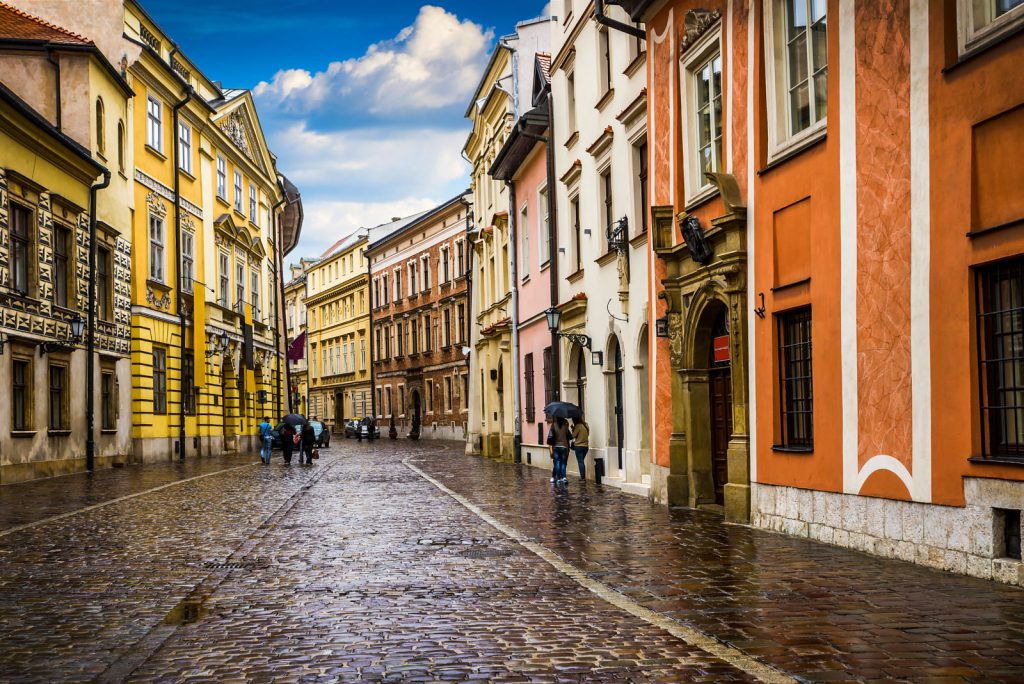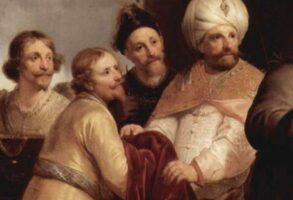
Published November 11, 2015
The Catholic Difference
Click here to buy George Weigel’s new book City of Saints: A Pilgrimage to John Paul II’s Kraków.
Several years ago, Father Raymond de Souza, one of my fellow faculty members at an annual Kraków-based summer seminar on Catholic social doctrine, made a trenchant observation about the city John Paul II used to call “my beloved Kraków.” Kraków, Father de Souza observed, was the city where the twentieth century happened in a singular way.
It had known the joys of national rebirth before being bludgeoned during World War II by five and a half years of a draconian Nazi occupation. The story behind Schindler’s List unfolded in Kraków; industrialized mass murder was pioneered at the Auschwitz-Birkenau complex, an hour’s drive to the west. After the war, to the east of the city, Polish communists built Nowa Huta, the first settlement in Polish history without a church: a grim, socialist-realist steel-milling town where “New Soviet Man” would be manufactured, along with steel. The terrible effects of terrible ideas—the race-madness of Nazism and the political-economic madness of communism —were felt in Krakow for over a half-century.
Yet something else happened in Poland’s ancient cultural capital: the answer to all that awfulness was also given, in visions of the divine mercy radiating from the heart of the Risen Christ experienced by a then-obscure Polish nun, a few years before the long dark night of occupation began. That healing message of divine mercy was then taken to the whole world by a mission-driven man of God who had once walked the frozen streets of the Nazi-occupied city in denims and wooden clogs—and then, four decades later, became the 263rd successor to St. Peter, taking the name John Paul II.
This singular city will be the site of World Youth Day-2016, which means that World Youth Day is coming home. For while these global Catholic festivals of faith and fellowship may have begun formally in 1986, they actually began in the imagination of Pope John Paul II when he was a young priest on Kraków, building a dynamic campus ministry in the darkest years of Stalinist terror. It was then that Father Karol Wojtyła came to the conviction that young people yearned to live lives of heroic virtue, however often their strivings might fail; and it was that conviction that led him to summon the young people of the world to World Youth Days, throughout his epic pontificate.
I’ve tried to explore these fascinating, providential connections in City of Saints: A Pilgrimage to John Paul II’s Kraków (Image Books), which introduces readers to the marvels of Kraków through the life of Karol Wojtyła: walking with him, vocationally, as his Cracovian life unfolded step-by-step as student, priest, bishop, and pope. My reflections on the Christian truths embodied in John Paul II’s life of heroic sanctity are then amplified by historical and artistic notes on the city provided by my friend and former colleague, Carrie Gress, the whole package being illustrated by the splendid photographs taken by my son, Stephen Weigel. (In the e-book edition, all the photos are in radiant color.)
The result, I hope, is a guidebook-with-a-difference. City of Saints tells you what the alert pilgrim (at World Youth Day-2016 or any other time) will want to know about the history, architecture, and art of one of the world’s most beautiful cities. But that’s available in many other guidebooks. The “difference” in City of Saints is that the fascinating story of Kraków and the splendors of the city’s fabric are set in the spiritual context of a journey of conversion, in which the reader walks with one of the great Christians of our time through the place that helped make him what he was: a witness to hope, whose hope was founded on a rock-solid faith in Jesus Christ as the answer to the question that is every human life.
To traverse their city with John Paul II and the many other saints of Kraków is to follow an itinerary of sanctity. And that reminds us that saints—men and women cooperating with God’s grace in their lives—are all around us, if we but see the world through the lens of faith.
George Weigel is Distinguished Senior Fellow of Washington, D.C.’s Ethics and Public Policy Center, where he holds the William E. Simon Chair in Catholic Studies.











